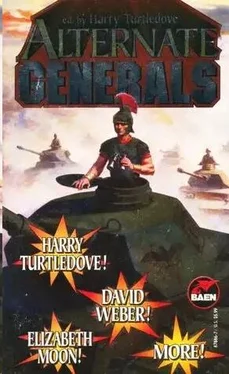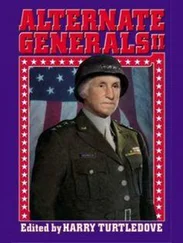Harry Turtledove - Alternate Generals
Здесь есть возможность читать онлайн «Harry Turtledove - Alternate Generals» весь текст электронной книги совершенно бесплатно (целиком полную версию без сокращений). В некоторых случаях можно слушать аудио, скачать через торрент в формате fb2 и присутствует краткое содержание. Год выпуска: 2000, ISBN: 2000, Издательство: Baen, Жанр: Альтернативная история, на английском языке. Описание произведения, (предисловие) а так же отзывы посетителей доступны на портале библиотеки ЛибКат.
- Название:Alternate Generals
- Автор:
- Издательство:Baen
- Жанр:
- Год:2000
- ISBN:0-671-87886-7
- Рейтинг книги:3 / 5. Голосов: 1
-
Избранное:Добавить в избранное
- Отзывы:
-
Ваша оценка:
- 60
- 1
- 2
- 3
- 4
- 5
Alternate Generals: краткое содержание, описание и аннотация
Предлагаем к чтению аннотацию, описание, краткое содержание или предисловие (зависит от того, что написал сам автор книги «Alternate Generals»). Если вы не нашли необходимую информацию о книге — напишите в комментариях, мы постараемся отыскать её.
Alternate Generals — читать онлайн бесплатно полную книгу (весь текст) целиком
Ниже представлен текст книги, разбитый по страницам. Система сохранения места последней прочитанной страницы, позволяет с удобством читать онлайн бесплатно книгу «Alternate Generals», без необходимости каждый раз заново искать на чём Вы остановились. Поставьте закладку, и сможете в любой момент перейти на страницу, на которой закончили чтение.
Интервал:
Закладка:
Cradock was not so sure of that. What he knew, with absolute certainty, was that the Coeben would cause the Royal Navy immense trouble if she were not sunk, and that the Admiralty wanted her sunk. And he could not sink her from here, sitting idly off Corfu waiting for Milne to give sensible orders. That fox Souchon had plans of his own.
As a technical problem of naval tactics, it came down to speed and guns. The German ships were faster, especially the turbine-powered Coeben, and Goeben had bigger guns that outranged his by several nautical miles.
Thus the Coeben could, in theory, stand off at a distance where her great shells could pound the cruisers, and their shots would all fall short.
He could think of ways to trap such a ship, ways to neutralize her superior speed and gun power What he could not imagine was any way to do it within the confines of his duty as a subordinate to Admiral Sir Berkeley Milne.
This latter problem, one more of strategy than tactics, had occupied his mind the day before, disturbed his sleep, and—this hot August morning—it affected his appetite.
He stroked his beard. He could understand why Milne had not followed the German ships into the Strait of Messina. England had gone to war because the Germans violated Belgian neutrality; she could hardly, in such circumstances, violate neutral Italy’s territorial waters.
In terms of strategy, as well, Italy’s unexpected neutrality was a precious gift, freeing the British and French fleets from the threat they had most feared.
But to leave the strait unguarded, except by ships too small to engage the Germans—that was folly indeed.
Should he, even in the face of Milne’s contrary orders, move his squadron over to back up Kelly in Gloucester? No, because all that dashing about had left his destroyers short of coal, and in a fight with Goeben he would need their help. Coaling had to come first.
He finished his breakfast without really noticing the taste and smell, mechanically downing bite after bite, and put his mind to the easier problem.
He would need every ship under his command, cruisers and destroyers alike. If he could have ordered the weather, a storm at night would have been ideal, but this was the season of burning blue days, one after another, and bright moonlight made night attack in the open sea as dangerous as in daylight. Not in the open sea, then. Wherever the Germans went, after Messina, they would have to run to earth eventually. For all her speed, the Coeben devoured coal; that meant coming into harbors. Close to the intricate coastline of Greece or Albania, her speed and her range would be of less use, and he could—if he guessed where she was headed-be in position to intercept her, appear at his range, not hers.
But only if he was free to do so. The solution of one problem doubled back to the insoluble greater one:
Milne’s refusal to let him act as he thought best. Cradock felt like a horse reined in by a timid rider, unable to run freely down to his fences. And he knew he would be blamed for any failure, as a horse is blamed for a fall by the very rider who caused the problem.
He pushed that thought aside—it did no good—and in order to place himself ahead of Souchon considered where in the Mediterranean he might go. West to harry the French, or escape via Gibraltar into the Atlantic?
Not with three battle cruisers who outgunned the Goeben, not to mention the French fleet, awaiting her there. North to the Austrians at Pola, their allies? No, because the Adriatic was a trap, and Souchon too smart a fox to run to an earth with only one door. Southeast to harry Port Said and the Suez, or Alexandria? Possibly, but where would he resupply? Or northeast, to Constantinople, with exits to both the Black Sea and the Mediterranean, exits easily mined and guarded by forts on land?
If Souchon had reason to believe that the Turks would let him in, that they were thinking of allying with the Germans… that is where he would go. Of course the Turks should do no such thing—they had declared themselves neutral. But… were they?
That was the question. Cradock spread marmalade on his toast and considered. Turks were Orientals, with who knew what logical processes. The British had been advising their navy, but the Admiralty had just seized two Turkish dreadnoughts under construction in British yards. The British had helped defend the Turks against the Russians, but they had also helped Greece gain her independence from the Turks. Which, at this juncture, would sway those devious pashas?
A tap heralded the arrival of his captains for the morning conference. It began with a situation report from his flag lieutenant that located each ship in the Mediterranean, so far as was known. Cradock suppressed the comment he wanted to make. Milne was only just around the northwest corner of Sicily, and proceeding with measured pace back toward the Strait of Messina.
“Where’s Indomitable?” one of the others asked.
“Back in Bizerte, coaling,” Fawcett Wray, his flag captain said.
“There was some problem with requisitions…”
Cradock said nothing. He had done his small best to improve the coaling efficiency of his squadron, but Milne’s insistence on personally approving every detail made it almost impossible. He seemed to think initiative more dangerous than any enemy.
“Requisitions!” That was Co-o-de, captain of destroyers.
Cradock had heard him on other occasions; now he cocked an eyebrow at the young man, who subsided like a kettle moved off the fire, steam almost visibly puffing from his ears.
“Gentlemen, the German ships will have to emerge today, or face internship.” That got their attention.
“Let me explain what I expect them to do.” Quickly he retraced his reasoning on the possible courses of action open to the Germans.
“The Turks would not dare harbor them,” Wray said.
“They must know it would turn us against them. We are their naval advisors; they asked for an alliance with us only last year—”
“Which was refused,” Cradock pointed out.
“The government did not want to inflame the Russians or the Germans with a formal alliance there… but I daresay the Turks took it differently. In addition, on our most recent visit to Turkey, I heard from the locals that Admiral Souchon was a great man. When I asked why, they told me about his having sent the crew of the Goeben to help fight a fire in a Turkish barracks in Constantinople, back in May. Several of the Germans died; the Turks—you know how emotional they are—got up a celebration of some kind.”
“But… the Turks are neutrals. Even if they admire Souchon—”
“They’re Turks. Intrigue is their nature, along with theft and pillage. They have as well that touchy Oriental vanity, which a trifling matter like assistance in a barracks fire would flatter. For Orientals, this is enough. It does not occur to them that any British captain would have done the same.”
“But you don’t seriously believe they would come into the war as German allies? Not after all we’ve done for them—”
“I doubt very much they would ally with Germany … but I can imagine them giving sanctuary to the Goeben and then finding Souchon more than a match for them. With those guns leveled at the city, can you imagine the pashas refusing his demands?”
“Well, sir,” Coode said, “if this is what you think the Germans are going to do, then why aren’t we blockading the southern end of the Strait of Messina, instead of sitting over here watching for Austrians?”
“Admiral Milne’s orders,” Cradock said.
“I intend to ask Admiral Milne for permission to position the squadron where we can engage the Goeben under more favorable terms. We will need to move south to do so. Therefore, we must attend to coaling the destroyers at once.”
Читать дальшеИнтервал:
Закладка:
Похожие книги на «Alternate Generals»
Представляем Вашему вниманию похожие книги на «Alternate Generals» списком для выбора. Мы отобрали схожую по названию и смыслу литературу в надежде предоставить читателям больше вариантов отыскать новые, интересные, ещё непрочитанные произведения.
Обсуждение, отзывы о книге «Alternate Generals» и просто собственные мнения читателей. Оставьте ваши комментарии, напишите, что Вы думаете о произведении, его смысле или главных героях. Укажите что конкретно понравилось, а что нет, и почему Вы так считаете.












